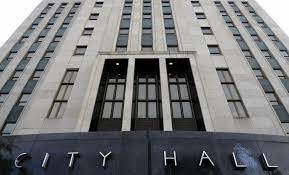By Ryan Michaels
The Birmingham Times
After three Birmingham City Councilors threatened to vote no on the $554 million fiscal 2024 operating budget, Mayor Randall Woodfin moved around $460,000 to satisfy their demands and successfully get the budget passed unanimously on Tuesday.
The fiscal year begins July 1.
Woodfin moved the money from the $15 million he set for street paving to pay for four new agents and two new clerks for code enforcement in the city’s department of Planning, Engineering and Permits.
The change came after a meeting last week at which one third of the nine councilors said they would vote no if more money wasn’t put toward code enforcement personnel.
Councilors Valerie Abbott, Hunter Williams and Darrell O’Quinn—all of whom said they would not approve the budget—said they were thankful to the mayor and his administration for their cooperation.
Abbott said she’s “been through a lot of budgets” in her 22 years on the council and that the mayor “fixed” this one before it became “contentious.”
“I think all of us came away feeling better than we felt before,” Abbott said.
The budget was approved in an 8-0 vote, with Councilor Clinton Woods absent.
Williams said while he and the mayor are “not going to always agree because we’re two grown adults, and two grown adults don’t agree on anything, ever,” that he was appreciative of the mayor’s collaboration with the council.
“I think that I speak for this council in that we really appreciate that when there is an issue, and it’s broken, and you have everything else on your plate, that you’re willing to take time to fix whatever that is,” Williams said.
Councilor Darrell O’Quinn, who also said he would vote no if the code enforcement concerns were not addressed, told the The Birmingham Times after the meeting that Tuesday’s vote showed “Birmingham city government is working.”
“That’s not to say that we’ve got it all figured out and that all the issues are addressed, and everything’s hunky-dory and perfect…but on a daily basis, good governance requires communication, and what you see is the result of that communication happening,” O’Quinn said.
Woodfin thanked members of the council for working with him to identify “our shared priorities. Throughout the process, we have discussed the individual needs of each council district and put together a plan … We are responding to what our residents have identified as their top priorities.”
Council President Pro Tem Crystal Smitherman said the mayor’s willingness to amend the budget sets him apart from former city leaders because “[Woodfin] actually listened to the council and proposed amendments.” Usually, she said, some former leaders would say, “This is my budget. This is how it’s gonna be. Take or leave it,” Smitherman said.
Council President Wardine Alexander also thanked Woodfin for “listening to this council” on code enforcement.
She also said she was appreciative of her council colleagues for the work they do in their communities and the dialogue “you’re willing to have among us, as well as with the mayor.”
Going forward, Abbott also said the council should consider laying out, in writing, its priorities around code enforcement and other city beautification initiatives before the next budget, so a fix at the “last minute” wouldn’t be necessary.
Neighborhoods, Youth, Public Safety And Transit
The budget includes $14.5 million for street resurfacing throughout the city — a $2 million increase – and $2 million for weed abatement, $1 million for demolition of blighted structures, an increase to $250,000 for traffic calming and $200,000 for sidewalk improvements.
Also included is $6 million specifically targeted to youth programs. These include allocations to Birmingham Promise, mental health services support in Birmingham City Schools, financial literacy and conflict resolution curriculums in schools, a safe haven program in Birmingham Parks and Recreation, the Kids and Jobs program and juvenile justice re-entry.
More than $16 million supports public transportation with an increase to the Birmingham Jefferson County Transit Authority for services including the Birmingham Xpress bus rapid transit system and the city’s Birmingham On Demand shared mobility service.
The budget provides a 5% cost of living adjustment for firefighters and police officers, funding for merit pay for eligible city employees and longevity pay for eligible employees.





